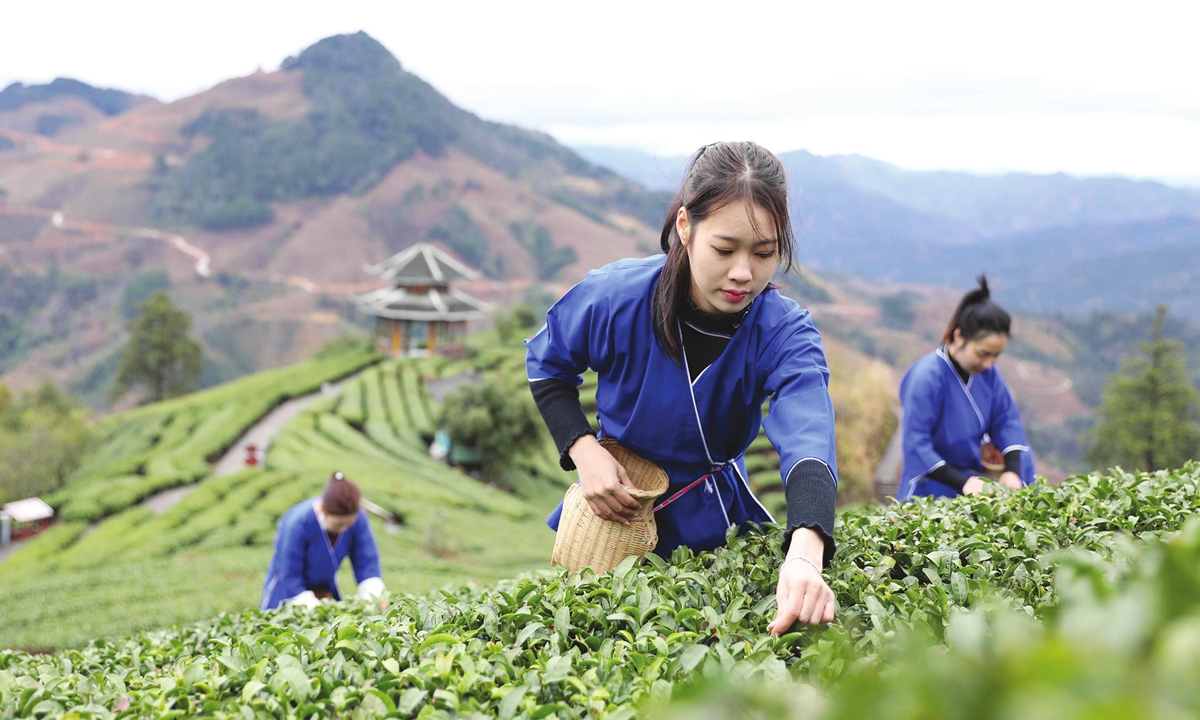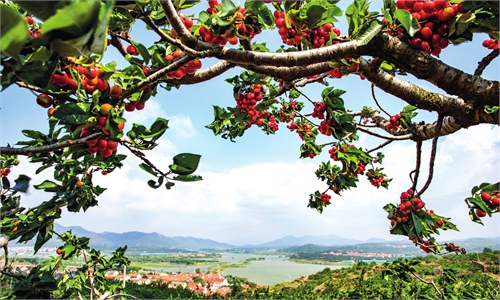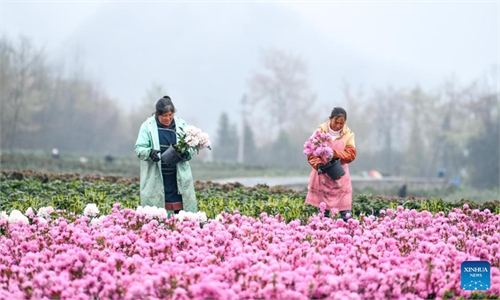SOURCE / PRESS RELEASE
Tea economy empowers rural revitalization in Sanjiang

A view of a tea plantation in Bajiang town of Sanjiang Photo: Courtesy of Sanjiang government
In recent days, as warm weather has caused flowers to bloom again, spring tea in the Sanjiang Dong Autonomous County in South China's Guangxi Zhuang Autonomous Region is also ripe for picking as farmers scramble to pick the youngest and most tender green tea buds, in a bid to catch up with "the first wisp of spring tea."
Sanjiang, a key county in the nation's rural revitalization drive, is located in the world's most recognized "prime tea-producing area" both latitudinally and longitudinally. In 2022, tea cultivation in the county reached 210,000 mu (14,000 hectares), with dry tea production reaching 21,800 tons and the annual output value totaling 2.5 billion yuan ($363.9 million).
Sanjiang focuses on developing the tea industry as an engine in the consolidation of poverty alleviation achievements and the further promotion of rural revitalization, creating better lives for local residents through improving their incomes.
Brewing success
In 1989, Sanjiang started tea planting in Bajiang town, igniting the flame of large-scale tea cultivation in the county. In 2007, it integrated funds from various departments to support the tea industry and earned the titles of "China's most famous tea township" and "China's organic tea township" five year later. In 2014, the county announced a decision to strengthen local tea planting, improve cultivated tea varieties, and provide technical training and quality management.
At present, a total of 490 tea processing plants have emerged in Sanjiang, with 300,000 tea-related personnel engaged in the industry, with the per capita annual income of tea farmers reaching more than 5,850 yuan.

Workers pick spring tea in a tea plantation in Bajiang town of Sanjiang. Photo: Courtesy of Sanjiang government
"In the last three years, tea sales from my company have grown at a rate of 20 percent per year, and in 2022, sales exceeded 60 million yuan. The ten cooperatives under the companies have cooperated with five villages and towns across the county, covering 20,000 mu of tea plantations and nearly 7,000 farmers," Zhang Guofu, head of a tea firm in the county said.
Zhang added that after the country optimized its COVID response policies, the company seized the opportunity to grab the market, and signed orders worth more than 30 million yuan with tea dealers in provinces including Zhejiang, Fujian, Guangdong and Anhui.
"This year, we expect to achieve more than 80 million yuan in tea sales revenue," Zhang said.
Cao Aiming, a tea artisan at another tea manufacturing firm said that his tea factory has been working for a week, receiving about 900 kilograms of fresh leaves a day, with purchases price per kilogram reaching more than 200 yuan, which has greatly stimulated the enthusiasm of tea farmers.
"We process orders non-stop from 6 am to 7 pm every day, working at full capacity, in a bid to bring the new tea to customers as soon as possible," Cao said.
In order to maximize the benefits of tea farmers and enterprises, Sanjiang holds a tea picking festival around the spring every year to fully demonstrate the county's tea culture and product advantage through online and offline marketing.
Upgrading operation
In order to change the low yield dilemma of tea in the past, Sanjiang actively encouraged leading enterprises to increase the scale of tea plantations, while concentrating on the need for human, material, and financial resources to support large enterprises, in a bid to help the local tea industry to improve tea varieties, quality and brand recognition.
Additionally, the county invited industry experts to carry out tea garden management training, further promoting tea production and quality. So far, Sanjiang has trained 20 tea industry leaders, 53 young talents in the tea industry, and 60 agricultural scientists in tea plantation.
The annual central rural work conference held in December 2022 pointed out that the development of industries is the most important on the agenda of rural revitalization, and supportive policies must be implemented to the letter in this regard.
Particular attention should be paid to local specialties. By relying on special agricultural and rural resources, benefits should be sought through developing a variety of agricultural functions, tapping multiple types of value in rural areas and integrated development of primary, secondary, and tertiary industries, according to the meeting.
Relying on the superior ecological environment of the "golden tea-producing area" and its rich ethnic culture, Sanjiang integrated leisure tourism, ethnic customs, and health and wellness into the tea industry, powerfully promoting the high quality development of the local tea industry.
Chen Zhen, head of the county, said that in the future, the county will focus on the cultural and technological empowerment, further promoting the standardization of tea plantations and strengthening the cultivation and management of new tea plantations and the revamping of old tea plantations.
"We will continue enhancing the deep processing of tea products, striving to turn 'small tea leaves' into 'golden leaves' to drive the county's economic development," Chen noted.


